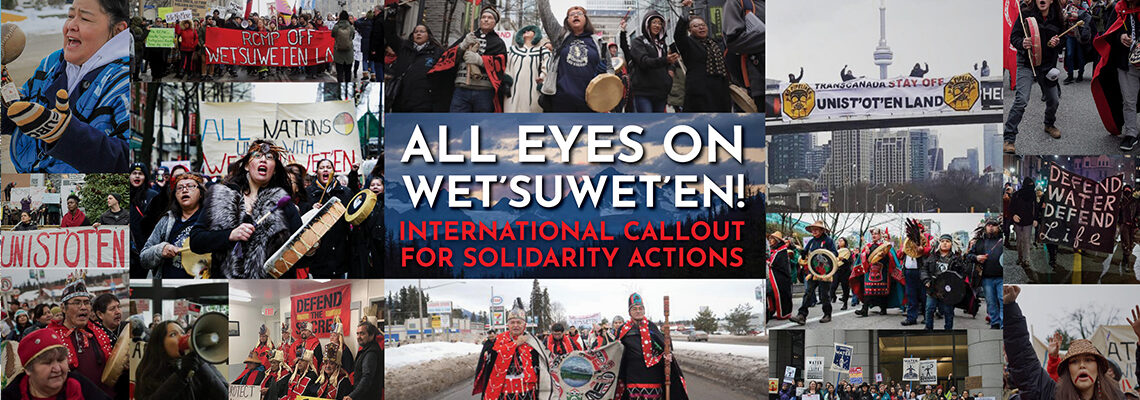
PESP Stands with the Wet’suwet’en First Nation’s Resistance against the KKR backed Coastal GasLink Pipeline
November 24, 2021
The Wet’suwet’en First Nation’s resistance against the KKR backed Coastal GasLink Pipeline (CGL) in Canada, has been escalating at the construction site and through outreach to financial firms invested in the project.
At least 29 people had been arrested as of November 19, including the Gidimt’en Checkpoint’s principal spokesperson and two journalists.
KKR acquired a majority stake in the Coastal Gaslink project in late 2019, which is being built to deliver tar sands fracked gas from northwestern British Columbia to a LNG export facility on the West Coast.
On November 14 the Gidimt’en Clan of the Wet’suwet’en issued their second official eviction notice to Coastal GasLink employees from the unceded territory in an effort to uphold ancient Wet’suwet’en trespass laws. CGL was given 8 hours to peacefully evacuate the territory. Gidimt’en spokesperson Sleydo’ commented:
“The Wet’suwet’en hereditary chiefs have never ceded, surrendered, or lost in war, title to this territory. That means that what we say goes. The eviction order from January 4th, 2020 says CGL has to remove themselves from the territory and not return. They have been violating this law for too long.”
Construction has been impeded by the blockades at the drilling site and the protests are threatening further project delays, Bloomberg reported. These additional delays come on the heels of minority owner TC Energy’s November SEC filing saying, “We continue to expect project costs to increase significantly along with a delay to project completion” due to permit delays and COVID-19 impacts.
Tensions at the site have increased, and on November 18 the Royal Canadian Mounted Police brought bulldozers to dismantle the blockades and began arresting the indigenous protesters, Reuters reported.
The Gidimt’en Clan has communicated directly with KKR and other financial backers of the pipeline that the project is a direct threat to indigenous sovereignty. In October the Hereditary Chiefs of the Gidimt’en Clan issued a letter to KKR and over 35 investors of the Coastal Gaslink Pipeline, demanding divestment from the project due to its violation of indigenous rights and breach of their investor commitments to social responsibility and racial justice. Private Equity Stakeholder Project, along with approximately 100 other advocacy groups, endorsed the call for divestment.
The letter to investors states:
“For over ten years, we have been asserting our sovereignty to stop fossil fuel companies from trespassing on our lands, leading to the cancellation of Enbridge’s Northern Gateway oil pipeline and Chevron’s divestment from the Pacific Trails Gas Pipeline…
Coastal GasLink project remains a high risk investment and faces increasing economic uncertainty, particularly in light of recent reports from the International Panel on Climate Change and the International Energy Agency both of whom have concluded that further fossil fuel expansion exacerbates climate change.”
Throughout the past month, the Gidimt’en Clan and the supporters have engaged in several direct actions at the Coastal GasLink construction site, resulting in several arrests, and have publicized an open call to supporters to mobilize and to come to camp in order to stand in solidarity against the pipeline.
Spokesperson Sleydo said they are currently making preparations to winterize the camp and have the full intention to hold their ground until construction on the Coastal Gaslink pipeline is halted permanently, CBC news reported.
In the last round of protests in 2020, additional costs associated with the project for RCMP enforcement against blockades alone reached $13 million, according to CBC news. KKR, which completed its acquisition of a 65% interest in the controversial pipeline project in May 2020, continues to invest in other fossil fuel assets. More details on KKR’s fossil fuel investments can be found in Private Equity Stakeholder Project’s KKR Energy Investments Troubled by Racial Injustice and Financial Losses April 2021 report.
